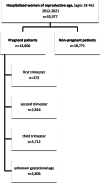Hospitalization of injured pregnant women: a decade of data
- PMID: 41219919
- PMCID: PMC12607194
- DOI: 10.1186/s13584-025-00727-y
Hospitalization of injured pregnant women: a decade of data
Abstract
Background: Pregnant women commonly sustain injuries following traffic collisions, falls, and intentional incidents such as domestic violence. Injuries sustained by pregnant women can lead to placental abruption, pelvic fracture, preterm delivery as well as maternal and fetal mortality. The aim of this study was to compare injury and hospitalization characteristics among hospitalized pregnant and nonpregnant women. For pregnant women, gestational age was analyzed according to injury severity and hospitalization characteristics.
Methods: The Israel National Trauma Registry was the data source for this retrospective study. Demographic, injury and hospitalization characteristics were collected and analyzed for pregnant and nonpregnant women hospitalized between Jan 1, 2012 and December 31, 2021. Among pregnant females, gestational age was identified. Categorical variables were compared using the Chi-square Test and Fisher's Exact Test.
Results: A total of 33,377 women, aged 18-45 years, were hospitalized due to trauma-related injury; 14,606 (43.8%) were pregnant, and 18,771 (56.2%) were not pregnant. Among the pregnant women, 91.7% had an Injury Severity Score (ISS) of 1, and 75.9% were hospitalized for a single day. In comparison, 31% of the nonpregnant women had an ISS of 1 (P < 0.0001), and 32% were hospitalized for one day. Traffic accidents contributed to 51.8% of hospitalizations among pregnant women, compared with 42.8% among nonpregnant women. While falls were more prevalent among pregnant women, a greater proportion of nonpregnant women were hospitalized with intentional injuries. Among pregnant women, injuries during the third trimester are most common. However, those hospitalized during the first trimester suffered from more severe injuries than injuries during the second and third trimesters did. Compared with nonpregnant women, pregnant women are more likely to sustain minor injuries, have shorter hospitalization stays, have fewer surgical interventions and have fewer admissions to intensive care units (ICUs).
Conclusions: This study provides important data for medical personnel and policymakers regarding trauma-related injuries among pregnant women. The results highlight the need to reassess observation and treatment protocols to balance appropriate maternal and fetal care while minimizing unnecessary hospitalizations. Collaboration among policymakers, obstetricians, and neonatal specialists is essential to refining evidence-based protocols that improve outcomes for pregnant trauma patients and their fetuses.
Keywords: Falls; Gestational age; Hospitalization; Pregnant women; Traffic collisions; Trauma-related injuries.
© 2025. The Author(s).
Conflict of interest statement
Declarations. Ethics approval and consent to participate: This study was conducted at the National Center for Trauma and Emergency Medicine Research, the Gertner Institute for Epidemiology and Health Policy Research, Sheba Medical Center, Tel Hashomer, Israel. Since no identifying information was available to the researchers, there was no need in receiving any type of informed consent. In addition, this study received approval from the Sheba Medical Center Institutional Review Board (IRB) (SMC 5138–18). All methods were performed in accordance with the ethical standards as laid down in the Declaration of Helsinki and its later amendments or comparable ethical standards. Consent for publication: Not applicable. Competing interests: The authors report no conflicts of interest.
Figures


References
MeSH terms
LinkOut - more resources
Full Text Sources
Medical

